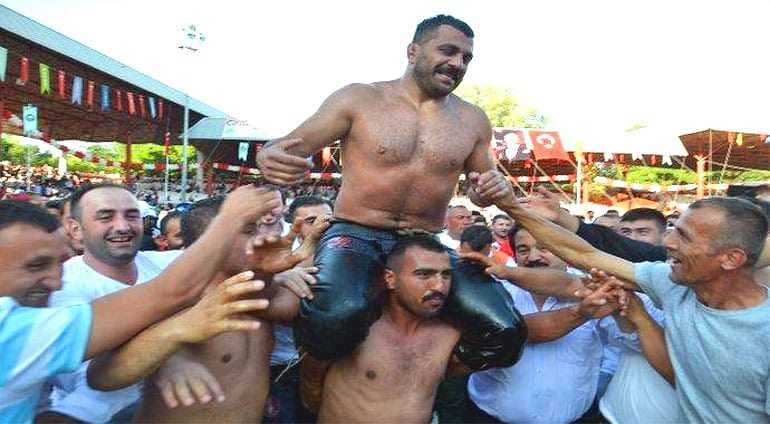This week, more than 100 drums of olive oil were poured over the heads of 1,000 contestants as part of one of the longest-running sporting events in the world; a Turkish olive oil wrestling tournament dating from the 14th century.
The 653rd Kırkpınar Oil Wrestling and Cultural Activities Week wrapped up today in Edirne, Turkish Thrace amid a backdrop of festivities, celebration and heritage.
Kırkpınar, meaning “40 springs” in Turkish, has been the site of the annual wrestling tournament since 1346, making it one of the oldest continuously-held sporting events in the world.

The week-long tournament and cultural celebration was a medley of music, food, sport, and celebrity – with davul drums and zurna (a traditional woodwind similar to the oboe) playing the “Kırkpınar March” and Turkish national anthem to open the ceremony.
Throughout this week folk dancing, Turkish home-cooking competitions, musical concerts and speeches filled the schedule, with the Turkish president attending the competition on the final day to congratulate the ‘başpehlivan’ (champion wrestler) and award him with a 14-carat golden belt as well as the title of “Chief Pehlivian.”
This time it was Fatih Atlı, from the Ladik district of Samsun, who defeated last year’s champion, Ismail Balaban Başpehlivan, to take home the coveted gold belt and the title of Başpehlivan.
“Pehlivian,” a Persian word which can be roughly translated into “hero” or “champion,” is a term given to all oil wrestlers regardless of their age or success. Opponents taking part in the tournament cover each other in olive oil before shouting “Hayda Bre!” to each other with gusto – a Turkish cry used to excite the opponent while simultaneously officiating the dual.
The combatants wear Kipset, a pair of Turkish lederhosen traditionally made from water buffalo hide and each weighing around 13 kilograms (30 pounds). Unlike a majority of wrestling forms, due to their opponent being drenched in olive oil, wrestlers are permitted to grab or reach inside each other’s clothes in order to lift their combatant over their shoulders, pin them to the ground, or bring them to exhaustion to win.
Olive oil – a mainstay of the Mediterranean diet, agriculture and ceremony since the Neolithic revolution – has been used as a component to wrestling for millennia. The ancient civilisations of Persia, Egypt, Assyria, Greece and Rome were all practitioners of the sport, with the earliest known example of olive oil-wrestling dating from 2650 BCE near the Chafadji-temple in Babylon.

Turkish oil wrestling, known as “yağlı güreş” in Turkish, has been practiced among Turkic-speaking peoples and Turkic ethnic groups throughout Western Eurasia since the ninth century. A marriage between traditional Seljuk wrestling practices and olive oil wrestling of Mediterranean antiquity, the modern sport was crystallised during the early years of Ottoman expansion into Europe. The Edirne tournament itself has its origins in 1361 and was formally inducted into UNESCO’s Intangible Cultural Heritage List in 2010.
Oil wrestling is steadily gaining support and awareness in other countries as a result of increased media coverage and the influence of Turkish expats. In more recent years the sport has been introduced to western countries such as the Netherlands and Switzerland as well as gaining some popularity in Asia in countries already familiar with traditional wrestling forms like Japan.








